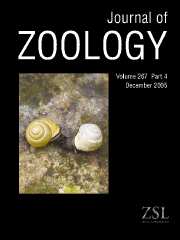Crossref Citations
This article has been cited by the following publications. This list is generated based on data provided by
Crossref.
Bowyer, R. Terry
and
Kie, John G.
2006.
Effects of scale on interpreting life‐history characteristics of ungulates and carnivores.
Diversity and Distributions,
Vol. 12,
Issue. 3,
p.
244.
Kausrud, K.
Mysterud, A.
Rekdal, Y.
Holand, Ø.
and
Austrheim, G.
2006.
Density‐dependent foraging behaviour of sheep on alpine pastures: effects of scale.
Journal of Zoology,
Vol. 270,
Issue. 1,
p.
63.
Loe, Leif Egil
Mysterud, Atle
Stien, Audun
Steen, Harald
Evans, Darren M
and
Austrheim, Gunnar
2007.
Positive short-term effects of sheep grazing on the alpine avifauna.
Biology Letters,
Vol. 3,
Issue. 1,
p.
110.
Wang, YiFei
Chen, JieJun
Liu, WenHua
and
Xu, RuMei
2007.
Effect of cultivating croplands and grazing in arid grassland habitats on the conservation of melitaeine butterflies in a mountainous area in Northern China.
Science in China Series C: Life Sciences,
Vol. 50,
Issue. 1,
p.
40.
Mysterud, Atle
Iversen, Camilla
and
Austrheim, Gunnar
2007.
Effects of density, season and weather on use of an altitudinal gradient by sheep.
Applied Animal Behaviour Science,
Vol. 108,
Issue. 1-2,
p.
104.
Mysterud, Atle
and
Austrheim, Gunnar
2008.
The effect of domestic sheep on forage plants of wild reindeer; a landscape scale experiment.
European Journal of Wildlife Research,
Vol. 54,
Issue. 3,
p.
461.
LITTLEWOOD , NICK A.
2008.
Grazing impacts on moth diversity and abundance on a Scottish upland estate.
Insect Conservation and Diversity,
Vol. 1,
Issue. 3,
p.
151.
GARCÍA, ROCÍO ROSA
JÁUREGUI, BERTA M.
GARCÍA, URCESINO
OSORO, KOLDO
and
CELAYA, RAFAEL
2009.
Effects of livestock breed and grazing pressure on ground‐dwelling arthropods in Cantabrian heathlands.
Ecological Entomology,
Vol. 34,
Issue. 4,
p.
466.
Holmquist, Jeffrey G.
Schmidt-Gengenbach, Jutta
and
Haultain, Sylvia A.
2010.
Does Long-term Grazing by Pack Stock in Subalpine Wet Meadows Result in Lasting Effects on Arthropod Assemblages?.
Wetlands,
Vol. 30,
Issue. 2,
p.
252.
Noel, Nadine M.
and
Finch, Oliver-D.
2010.
Effects of the abandonment of alpine summer farms on spider assemblages (Araneae).
Journal of Insect Conservation,
Vol. 14,
Issue. 5,
p.
427.
Mysterud, Atle
Aaserud, Ragnar
Hansen, Lars Ove
Åkra, Kjetil
Olberg, Stefan
and
Austrheim, Gunnar
2010.
Large herbivore grazing and invertebrates in an alpine ecosystem.
Basic and Applied Ecology,
Vol. 11,
Issue. 4,
p.
320.
Martinsen, Vegard
Austrheim, Gunnar
Mysterud, Atle
and
Mulder, Jan
2011.
Effects of herbivory on N-cycling and distribution of added 15NH 4 + in N-limited low-alpine grasslands.
Plant and Soil,
Vol. 347,
Issue. 1-2,
p.
279.
Martinsen, V.
Mulder, J.
Austrheim, G.
and
Mysterud, A.
2011.
Carbon storage in low-alpine grassland soils: effects of different grazing intensities of sheep.
European Journal of Soil Science,
Vol. 62,
Issue. 6,
p.
822.
Holmquist, Jeffrey G.
Jones, Jennifer R.
Schmidt-Gengenbach, Jutta
Pierotti, Lyra F.
and
Love, Jason P.
2011.
Terrestrial and Aquatic Macroinvertebrate Assemblages as a Function of Wetland Type across a Mountain Landscape.
Arctic, Antarctic, and Alpine Research,
Vol. 43,
Issue. 4,
p.
568.
LITTLEWOOD, NICK A.
PAKEMAN, ROBIN J.
and
POZSGAI, GABOR
2012.
Grazing impacts on Auchenorrhyncha diversity and abundance on a Scottish upland estate.
Insect Conservation and Diversity,
Vol. 5,
Issue. 1,
p.
67.
Martinsen, Vegard
Mulder, Jan
Austrheim, Gunnar
Hessen, Dag O.
and
Mysterud, Atle
2012.
Effects of Sheep Grazing on Availability and Leaching of Soil Nitrogen in Low-Alpine Grasslands.
Arctic, Antarctic, and Alpine Research,
Vol. 44,
Issue. 1,
p.
67.
Rickert, C.
Fichtner, A.
van Klink, R.
and
Bakker, J.P.
2012.
α- and β-diversity in moth communities in salt marshes is driven by grazing management.
Biological Conservation,
Vol. 146,
Issue. 1,
p.
24.
Davis, Stacy C.
Burkle, Laura A.
Cross, Wyatt F.
Cutting, Kyle A.
and
Valentine, John F.
2014.
The Effects of Timing of Grazing on Plant and Arthropod Communities in High-Elevation Grasslands.
PLoS ONE,
Vol. 9,
Issue. 10,
p.
e110460.
Takagi, Shun
and
Miyashita, Tadashi
2014.
Scale and system dependencies of indirect effects of large herbivores on phytophagous insects: a meta‐analysis.
Population Ecology,
Vol. 56,
Issue. 3,
p.
435.
BRANSON, DAVID H.
and
HAFERKAMP, MARSHALL A.
2014.
Insect herbivory and vertebrate grazing impact food limitation and grasshopper populations during a severe outbreak.
Ecological Entomology,
Vol. 39,
Issue. 3,
p.
371.


